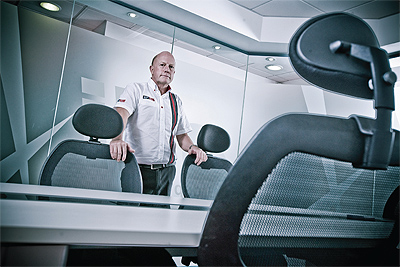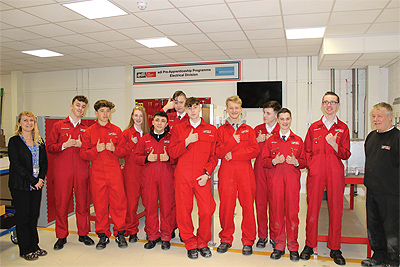adi Group’s Success Story and Efforts to Promote Engineering Careers
Making engineering great again
adi Group achieved major growth in 2017, strictly following its five-year business plan, while actively trying to promote engineering as a preferred career path for schoolchildren
At a time when the manufacturing sector in the UK is not as strong as it used to be, it looks hard to achieve considerable growth, but adi Group – a multi-disciplined engineering service company, managed just that.
The Birmingham headquartered business, which delivers engineering services across the automotive, food & beverage, manufacturing, aerospace & defence, pharmaceutical and petrochemical sectors, reported a 26 per cent growth in turnover in 2017. Working to a rolling five-year business plan, adi Group aims to grow turnover organically from its current level to beyond the £200 million mark by 2020.
Founder and CEO, Alan Lusty explains the reasons behind adi Group’s success. “It has been a planned growth. From the moment we started the business 28 years ago, we have always been guided, first and foremost, by our internally developed five-year Business Plan. The plan helps us stay focused on where we’re going as a business and how we’re going to get there. It also ensures that everyone within the business, from the main board to the shop floor, has clarity over which direction the business is going in and how the work they do every day contributes to us achieving our goals.
“We review the plans regularly and adapt them where necessary. This is really important because the marketplace and business climate is always changing so we have to be prepared and ready for change – especially with the rapid growth of new technologies within our industry coming to fruition.
“Our business vision has always excluded standing still – you either ‘grow’ or ‘die’ – because things will always happen in a way you have not envisaged. We have been making targeted investments to broaden our portfolio of services in the past five years to achieve this growth and we are looking to extend this into the future.
“When we drafted our latest business plan in January 2017, we projected that the company should reach the £200 million turnover mark by 2020, so we continue to work towards this goal,” Alan comments. “But it’s not just expanding our services and planning. The biggest investments that we make are in our people. We do not have products, our staff are our product, so we aim to continually develop the team spirit and skills of our workforce.
“We have also increased the number of our employees – when we presented the business plan last year, we had just over 500 members of staff, today we have over 600 employees in our team.”
Alan believes that despite the tough times in the manufacturing industry, there will be sufficient opportunities for adi Group to steer its 2020 vision to a successful completion. Where he sees reasons for concern, however, is whether the company will be able to attract enough new people in the next two or three years to speed up the growth.
At the beginning of 2018, the business announced its clear-cut goal to create 500 jobs in the next four years, which will nearly double adi Group’s existing workforce. “Finding qualified people and persuading them to start a career in engineering is a widespread issue in our industry,” Alan points out.
A recent report by Engineering UK highlighted that there is expected to be an annual shortfall of up to 59,000 engineering graduates and technicians to fill core engineering roles, and some 203,000 people with Level 3+ engineering skills will be needed every year to meet demand through to 2024.
Alan believes that the perception of the engineering industry amongst young people is part of the problem. “Unfortunately, the way engineering can sometimes be portrayed can be a hindrance, but we’re working hard to break down these misconceptions and stereotypes.
“We’re trying to show young people that engineering is all around us. For example, when we start to talk about engineering in everyday life situations and how it’s behind everything from the phones in our hands, the apps we use, to the concerts we attend and the clothes we wear, young people start to see the range of industries that engineering touches. Often these are things they may not have thought an engineer was behind.
“Research is showing that more young people are becoming interested in engineering, which is fantastic and shows that STEM initiatives and industry campaigns are working, but there is still more work to be done. We need to work to raise awareness of not only the opportunities within engineering, but also the routes into the sector so that students know which subjects and qualifications they should look to take to break into the industry.”
In order to change the way not just teachers and children, but also the wider public, look at engineering, adi Group has rolled its sleeves up, and has introduced a school ‘pre-apprenticeship’ scheme that attempts to renew the interest in the profession among teenagers.
Alan shares his thoughts on the current condition of the UK’s education system, in the sense of its relationship with the manual industries. “Evidently, the teachers are trying to intensively encourage their students to prepare for their A-levels and then go to university. What we have started to do, is try to explain that it is not like that. First of all, the truth is that not all children are academic, some of them are much better with their hands and have valuable skills that the manufacturing and engineering sector’s need. At the same time, they are almost forced to go for a higher education, because this is the way the education system has been programmed for the past number of years. Sometimes apprenticeships can be seen as the lesser of two options, when the reality is apprenticeships have and continue to increase in quality and in terms of the opportunities to progress. We now have degree level apprenticeships for instance.
“Because apprenticeships have not been on the agenda for 15-20 years now, it is equally as challenging to explain to parents that there are benefits in them, because they themselves have not grown up in the years when enrolling as an apprentice was still popular,” Alan reasons. Nevertheless, the first group of pre-apprentices taken by adi Group in 2016, is now nearing the finishing line of its two-year training, with final exams being held in April 2018.
“We welcomed 12 children, aged 14, in 2016 and 11 of these have now come to the end of their training period, which will be topped out with a formal graduation ceremony in June. Five, of the now 16-year-old children, have applied for a job with us, which, we feel, marks the initiative’s success. We also opened our doors for the second set of 12 children in September 2017, so we are definitely planning to continue training students,” Alan confirms.
He claims that the pre-apprenticeship programme is an investment in people, but does not aim to generate direct profit for adi Group. What is more, he will be happy if the scheme proves transferrable to other businesses, who can benefit from the services of the qualified pre-apprentices trained by his company. “This has always been the plan for us. There are positives both for the child and the industry that there are young people who, at the age of 16, have already gone through extensive health and safety training and are capable of communicating internally with the workforce. These are valuable skills that we will happily share with other companies. We have to keep that going, because many people still have the wrong idea that employing apprentices is someone else’s responsibility, or a Government’s problem to solve. No, it is an issue that only the UK businesses can sort out,” Alan upholds.
Discussing the nature of the work he expects adi Group to be engaged with, in the next couple of years, Alan pinpoints the automotive and the food & beverage sectors as two areas where the company will seek further development. “Here, in the UK, the manufacturing industry needs to see what the future of the diesel and the electric vehicles is going to be, so that we know how we should work around these,” he observes. “With regards to the food and beverage sector, last year we started a new company, called adi Food and Beverage Services Ltd. This team is focused on creating new opportunities for us in this market, so this is another market sector we are looking forward to further develop. In 2018 and 2019, we are also planning to increase our activity in the pharmaceutical and aerospace markets. We’re really looking forward to what the future holds for adi Group and the opportunities that will emerge for the engineering sector at large. It’s a really exciting time to be part of the industry,” he concludes.
adi Group
Services: Multi-disciplined engineering
